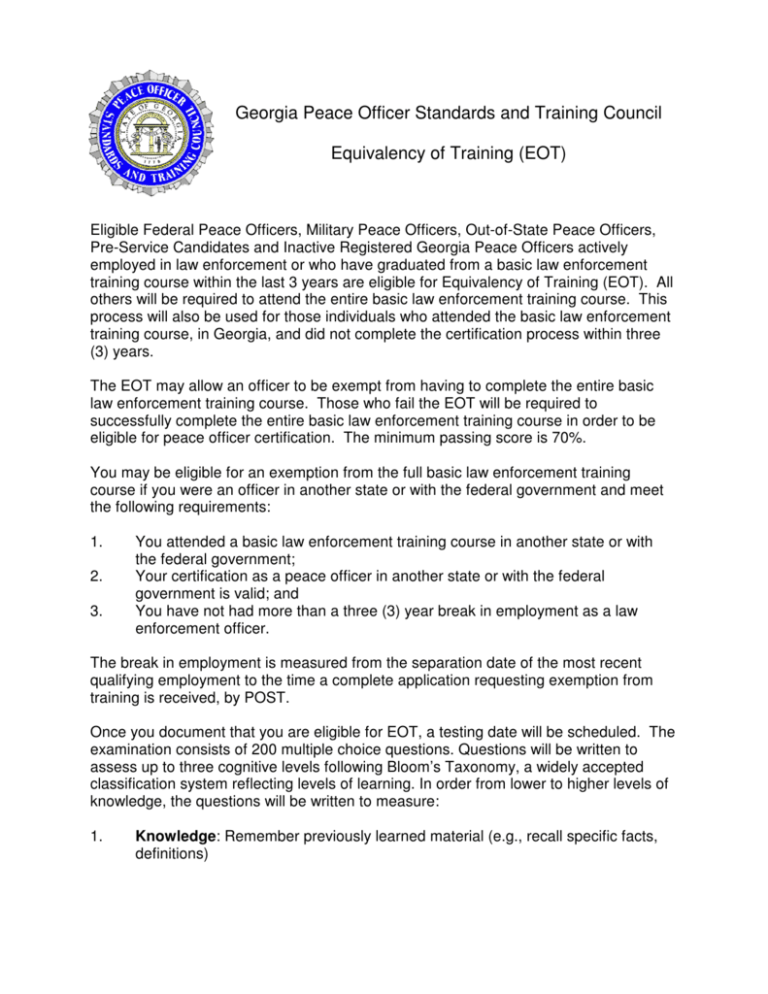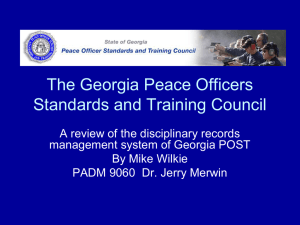Equivalency of Training (EOT) - Georgia Peace Officer Standards
advertisement

Georgia Peace Officer Standards and Training Council Equivalency of Training (EOT) Eligible Federal Peace Officers, Military Peace Officers, Out-of-State Peace Officers, Pre-Service Candidates and Inactive Registered Georgia Peace Officers actively employed in law enforcement or who have graduated from a basic law enforcement training course within the last 3 years are eligible for Equivalency of Training (EOT). All others will be required to attend the entire basic law enforcement training course. This process will also be used for those individuals who attended the basic law enforcement training course, in Georgia, and did not complete the certification process within three (3) years. The EOT may allow an officer to be exempt from having to complete the entire basic law enforcement training course. Those who fail the EOT will be required to successfully complete the entire basic law enforcement training course in order to be eligible for peace officer certification. The minimum passing score is 70%. You may be eligible for an exemption from the full basic law enforcement training course if you were an officer in another state or with the federal government and meet the following requirements: 1. 2. 3. You attended a basic law enforcement training course in another state or with the federal government; Your certification as a peace officer in another state or with the federal government is valid; and You have not had more than a three (3) year break in employment as a law enforcement officer. The break in employment is measured from the separation date of the most recent qualifying employment to the time a complete application requesting exemption from training is received, by POST. Once you document that you are eligible for EOT, a testing date will be scheduled. The examination consists of 200 multiple choice questions. Questions will be written to assess up to three cognitive levels following Bloom’s Taxonomy, a widely accepted classification system reflecting levels of learning. In order from lower to higher levels of knowledge, the questions will be written to measure: 1. Knowledge: Remember previously learned material (e.g., recall specific facts, definitions) 2. Comprehension: Basic understanding of principles and concepts; ability to grasp the meaning of material (e.g., can provide examples, distinguish between concepts) 3. Knowledge Application: Ability to use learned material in new and concrete situations or to solve a problem (e.g., apply knowledge to “real life”) Questions will primarily be targeted at the comprehension and knowledge application level, with relatively few questions at the basic knowledge (recall) level of cognitive understanding. General Knowledge 1. Federal and State Laws and Court Processes 2. Professional Conduct and Relating with Others 27 17 10 Number of Items (% of Test) 67 (33.5%) 47 20 Technical Knowledge 3. Procedures for Arresting and Controlling Persons 4. Investigative Laws and Procedures (e.g., Search and Seizure, Evidence 5. Traffic patrol and violations/accident investigations 6. Procedures for Responding to Emergency and Terrorist Situations 7. Procedures for dealing with domestic and gang-related incidents 65 8 29 133 (66/5%) 15 50 15 9 50 10 4 8 92 200 Category Total Number Of KSAs Once the request is processed, a testing date will be scheduled. You will be notified via e-mail of the scheduled test date. Until all parts of the EOT application are complete, no test date will be scheduled. The minimum passing score is 70%. If you successfully complete the exam, documentation will be required to demonstrate proficiency in high liability areas. Those high liability areas are: 1. 2. 3. 4. Firearms Use of Deadly Force CPR/First Aid Emergency Vehicle Operations The training required for the high liability areas will be provided by the Georgia Public Safety Training Center, in Forsyth, Georgia. Please note that there may be additional cost for this training based upon your employment status at the time of EOT. You will need to contact the academy to determine scheduling of this training NOTE: Pursuant to O.C.G.A. § 35-8-10 (a) No person required to comply with the certification provisions of this chapter shall be employed or appointed by any law enforcement unit without certification from the council that the applicant has met the preemployment requirements established in this chapter, and no candidate shall perform any of the duties of a peace officer involving the power of arrest until such training shall have been successfully completed. The EOT application may be found at: http://www.gapost.org/pdf_file/eot_app.pdf FEES: The administrative fee for EOT and Application Processing is $300. No request will be processed without the appropriate fees. A certified check or money order for $300, made out to Georgia POST Council must accompany each application for Equivalency of Training. You may also pay for this on-line on the Georgia POST Council website. Simply attach a copy of your receipt to the application for EOT. The application processing fee is non-refundable. You may also be required to pay for Georgia Applicant Processing Service, GAPS, (fingerprints) and a background investigation, depending upon your employment status. Persons employed full-time with a Georgia law enforcement agency may have these services provided by the hiring authority. The cost for GAPS is $52.90 (POST Pre-Service Student). For more information on GAPS, please visit: http://www.ga.cogentid.com/GA_DOCS_html/GA2_Intro_GAPS.htm. Payment Instructions and locations for submitting fingerprints are provided here. Payment is made directly to CogentID (GAPS). STUDY MATERIALS: POST encourages all applicants to study for this examination. The “Georgia Law Enforcement Handbook” is available for purchase from the Georgia Public Safety Training Center. Contact information for the Georgia Public Safety Training Center may be found at: http://www.gpstc.org/. This book may be available from on-line retailers; however, it is typically more affordable, and current, from the Georgia Public Safety Training Center. While all information in the Law Enforcement Handbook is relevant, you should focus your attention on the following code sections: Title 15 Chapter 11 = Juvenile Proceedings Title 16 = Georgia Criminal Offenses Title 17 = Criminal Procedure (Also review Part I "Arrest and Criminal Investigative Procedures") Title 40 = Traffic Law Although not required, you may also consider purchasing the Georgia Peace Officer Reference Text (PORT). It is also available for purchase from the Georgia Public Safety Training Center. SAMPLE QUESTIONS: Several sample questions may be found at: http://www.gapost.org/pdf_file/eotsampleq.pdf Effective: July 1, 2013






